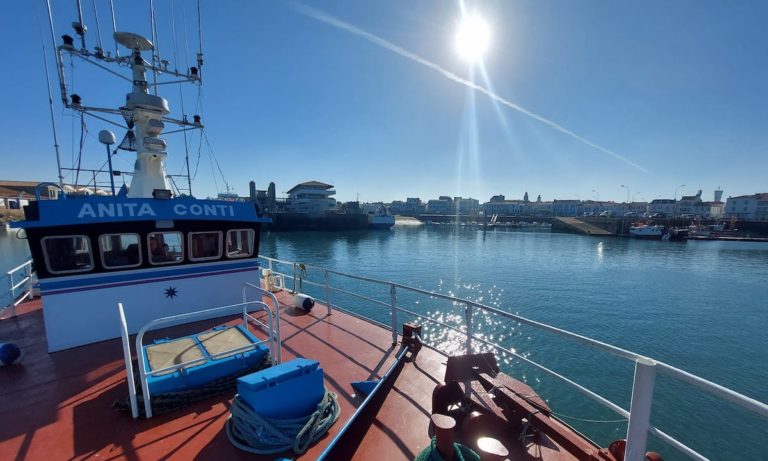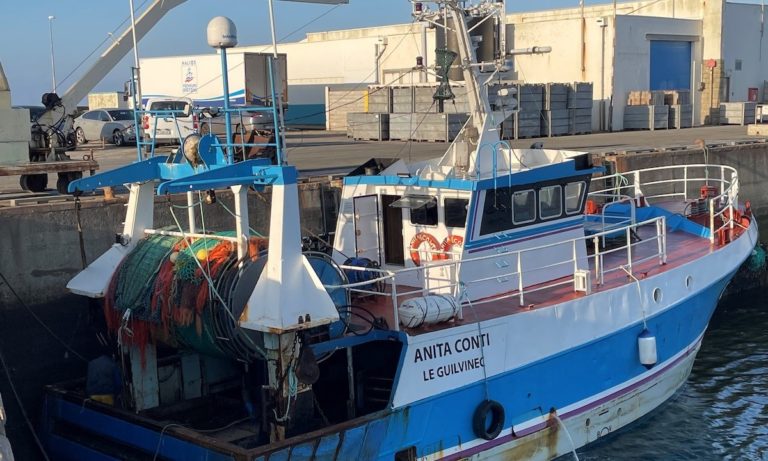Hydrogen power for fishing
Apr 11, 2023 / by admin / In Actualités / Comments Off on Hydrogen power for fishing

One of the nine vessels in the fleet operated in Brittany by Julien Le Brun has been selected for a study into incorporating a hydrogen fuel cell into its propulsion system, conducted by IPC (l’Interprofession du port de Concarneau) following a tender by the Brittany Regional Authority.
The key objective is to identity alternative fuels to high-cost diesel, and to take steps towards decarbonisation of the fishing industry, which trawler operator Julien Le Brun sees as a major issue for the sector.
Why did you agree to take part in the PILOTHY project?
Today many fishermen are wondering if we will still be here tomorrow. We have less and less visibility and the increase in diesel costs only increases the difficulties we face. So when Jean-François Ansquer suggested Anita Conti to test the feasibility of a conversion with hydrogen propulsion, I immediately said yes. Even if there’s no immediate, we must find other sources of energy. I am well aware that this will be a long road but we must move forward. I have tried, but I couldn’t find anything really effective in reducing consumption. The crew reduced their steaming speed and fuel consumption, but this was not anything significant. The answer will not come from fishermen, but from specialists and technicians working on the issue.
Coprexma knows Anita Conti which seemed to be the most suited to this study. While remaining a coastal vessel, which was built in Concarneau, it’s larger than the others. With its 17.30 metre length and large hold, it has the capacity to accommodate new equipment and an H2 system.
What do you expect from this study?
Our fleet is far too reliant on diesel. This is no longer economically viable and it also has an impact on the environment. The proportion of fuel in the operation of my vessels fluctuates between 20 and 30%. Oddly, Anita Conti is the one that consumes the least when fishing – around 10% less than the others.
In addition to this is an overall increase in maintenance costs, the cost of equipment… We are getting to the point at which it no longer adds up. The trawler fleet can still manage if the owner has no loans. But with repayments and old vessels that require maintenance, this is not viable. We really have to find alternatives, otherwise we risk no longer maintaining our vessels.
The price of fish has gone up and the resources are there; It’s not enough?
Yes it’s true, I had an excellent turnover in 2022. But each of my vessels costs me around €15K in fixed costs per month – loans, insurance, social costs, equipment, maintenance – not including fuel, and that’s enormous. Fishing more is not an option. There are nine fishing vessels and each spends a maximum of 250 days a year at sea, with crews rotated. So each crewman spends at most 160 days at sea.
This is a balance that suits the crews, the company and the resources, which have time to rest and renew. This also provides a better quality of life for the crew. So fishing more would have serious consequences for resources as well as for the crews.
You have invested a lot in recent years, what’s your conclusion?
The question of diesel always recurs. In 2008, 2009, 2010 the industry came together but we did not really make progress. This time we are really up against the wall. If I were doing all this again, I would not have built up a fleet of bottom trawlers. I would have built versatile vessels outfitted for fishing with static gear, less fuel-hungry and with lower impacts.
We need more efficiency today and we need to decarbonise. For this we need the help of specialists on the one hand, and the state and Europe on the other to finance this regeneration.
Do you have other projects?
For some the decommissioning is the solution. I want to build the ship of tomorrow in terms of energy. So yes, I put Anita Conti forward for the PILOTHY project and I’m also looking at other solutions. I am currently working on a multi-purpose vessel project that would be equipped with systems to decarbonise fishing.
On an experimental basis, I want to test static gear such as langoustine traps and fish traps for the offshore area. The idea would also be to use other sources of energy. I am working with Coprexma on this and I plan to respond to the tender for decarbonisation of fishing vessels under EMFAF, and to apply to the decarbonation fund announced by the Secretary of State for the Sea, Hervé Berville.

The PILOTHY project
This consists of a feasibility study into integrating an H2 fuel cell on board an existing fishing vessel. The objective is to provide technical solutions, an assessment of financial feasibility and validation by a safety commission, while ensuring regular exchanges with vessel operators. The study will take into account specific limitations of Anita Conti. The study will be concluded before the summer.
PILOTHY is a decarbonisation initiative for fishing vessels led by a consortium made up of members of the Port of Concarneau Interprofession (IPC). These include electrical and energy systems specialist Barillec, Piriou engineering, naval architect Coprexma, engineering company Méca Diesel, mechanical workshop Semim and electronics engineering company Marinelec Technologies.
The PILOTHY project is backed by an €87,000 subsidy.
Read on Hook and Net.